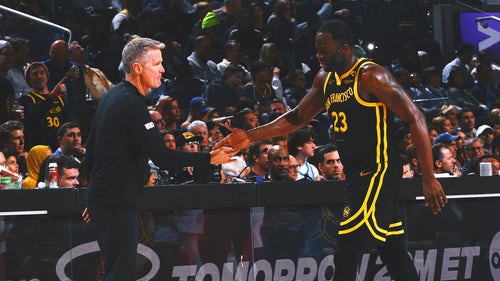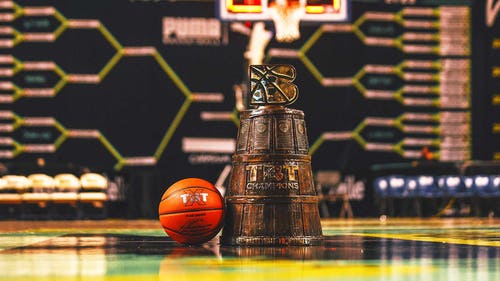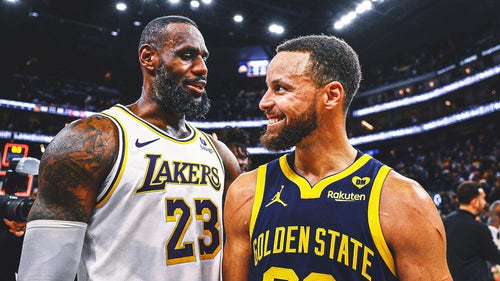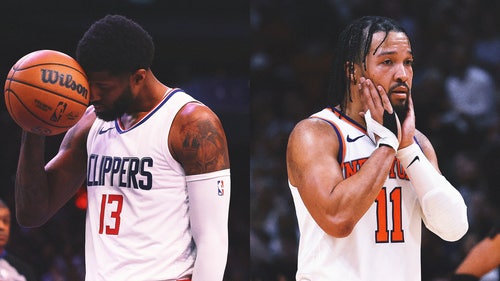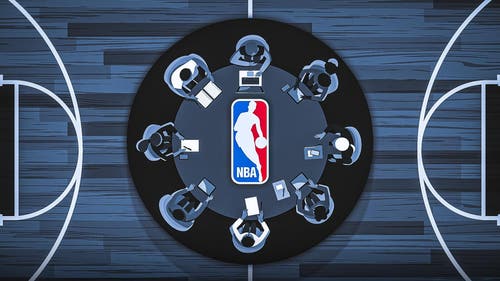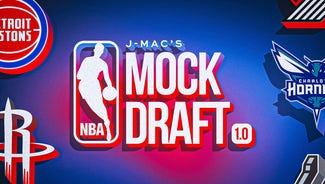
Meet Lonzo Ball's Agent ... (No, It's Not LaVar)
In the eye of the draft hurricane, the NBA's new first family eagerly awaits Adam Silver's announcement: With the second pick, the Los Angeles Lakers select Lonzo Ball! LaVar beams, three gold Bs running down his black tie. His three boys, draped in custom-made ensembles, brace for a choreography of secret handshakes. There's a man standing just behind the green room table, his burgundy suit perfectly pressed, wearing a serene smile. The selection is as much a culmination of his own grind as is the 6'6" point guard with that innate passing gene.
His identity became news in early April, when Lonzo officially entered the draft and signed with an agent. “How did he beat out the [Jeff] Schwartzs, the Wasserman Group, Billy Duffy, all of the known guys will all of the major clients?” wonders Sonny Vaccaro, the legendary former sneaker executive. He was virtually unknown amongst NBA personnel. “In our front office, everyone was like, ’Who the hell is this guy?'” says Warriors assistant GM Kirk Lacob.
With LaVar leaving so little about his family to the public's imagination, one essential question remains: Who is Harrison Gaines?

At first, Harrison Gaines wanted to be Michael Jordan. He was gifted Jordan's Come Fly With Me on VHS as a three-year-old. Gaines studied the tape, mirroring every acrobatic move His Airness performed on the plastic, miniature hoop in his family's Victorville, Calif. living room. He could lose himself in the exercise for hours. “That was like the best babysitter,” says his mother Stephanie.
She introduced both her two sons to acting and modeling—Gaines remains a member of the Screen Actors Guild. He secured a role in the 1999 TV movie Michael Jordan: An American Hero, where, in the beginning of the flick, a young Jordan hoops in the backyard with several friends amidst a family barbecue. The director had to repeatedly yell cut while filming the scene. A pubescent Gaines was cast as a mere background figure, yet he relentlessly took the actor playing Jordan one-on-one. “To Harrison, it wasn't a movie,” Stephanie says. “But the real game.”
Of course, Gaines took it seriously. In grade school, he skipped lunch so he could prolong recess and created a schoolyard league, printing out team schedules and everything. In middle school, he recruited a towering football player named Koray Keys to discover the magical, orange ball. The team needed a paint presence, so every night that fall, he trained Keys on the hoop in the family's cul de sac. Sure enough, they morphed into a dynamic inside-out tandem and captured a championship that winter.

When Jordan began his Flight School summer camp in nearby Santa Barbara, Gaines had to attend. Next came the Stanford Camp, where the preteen emerged as the clear-cut MVP. “He was the superstar for two or three straight years,” Lacob, a fellow camper, remembers. Gaines traveled the country attending camps. His father, Harry, pilots for United Airlines, which allowed the family to plan vacations around each grassroots event, paying only surcharges for airfare. Harry plied his trade flying cargo planes for Operation Desert Storm. Years of watching Harry & Son inspired his first born's name, an adapted spelling of the phrase “Harry's son.”
Gaines added more accolades to his dossier at Junior Five-Star Basketball camp, where Fred Benjamin grew enamored by the 11-year-old talent with the roving family. “He had a spark about him that was unexplainable,” Benjamin says. Then the athletic director at Saint Thomas Choir School in New York City, Benjamin invited Gaines to train under his tutelage each summer in Manhattan. He would drill the young pupil for four intensive days, introducing him to grueling, full-court dribble combination workouts and later pinning Gaines up against local college talent like Carl Elliott and Dante Milligan. “All the guards in New York are at you, at you, at you,” Gaines says. “But then I'd have to come right back.”
He infused that east coast grit into the vaunted Inland Empire AAU program, which had already produced first-round picks Antoine Wright and Ed Gray. Gaines morphed into an attacking point guard, knifing into the teeth of opposing defenses, capable of finishing amongst the trees or distributing to open shooters. He matched up against Darren Collison on the daily and sparred with Darren Moore, later known as UC Irvine's Spiderman. When he wasn't honing his craft, Gaines sharpened his mind helping coach his brother Silas's 12U team. “He has a very high basketball IQ,” says Inland coach Elvert Perry.
After one tournament, Gaines reported back to Benjamin in New York. The team had won. He played alright. “He just ripped into me,” Gaines says. Alright was no longer acceptable. Elite college players didn't tolerate anything short of superlative. “You have to kill,” Gaines internalized. Benjamin's advice extended beyond the court. He urged Gaines to listen to classical music the night before his SATs to stimulate brain function.
Alongside future Grizzlies draft pick Jamaal Franklin, Gaines emerged as one of the most decorated players in Serrano High School history—the school later retired his jersey—and The University of Pennsylvania expressed early interest. Stanford and Oregon also called; Colorado State and Boise State offered. But Gaines found himself housed in the Inn at Penn for an official visit, allured by the Quakers' three-straight Ivy League titles, intoxicated by the Palestra's hallowed hardwood. “It was historic,” Gaines says. The departure of twice-defending Ivy League Player of the Year Ibrahim Jaaber also presented an opportunity to clasp the keys to the program. “Harrison was the guy,” says Perry Bromwell, a former Penn assistant.
As the first winter winds whistled across Philadelphia, Gaines found his footing at Penn. He led the Ivy league in assist to turnover ratio as a freshman in 2007-08. Meanwhile, brilliant classmates were accepting internships at Goldman Sachs. “When you're around them everyday,” Gaines says. “It raises your level.” Thoughts of life-after-basketball began to creep in. At his father's suggestion, player representation had long been appealing. Gaines dipped into David Falk's and Drew Rosenhaus's books, jotting thoughts into the yellow notepad app on his iPhone.

Zack Rosen arrived on campus the following fall. Glen Miller's staff envisioned a dynamic, dual ball handler backcourt, years before the craze permeated the NBA. Gaines harbored a score-first mentality. Miller found his pure floor general in the redheaded guard from Jersey. “For reasons I'm not too sure about to this day, they didn't stay in the program as a tandem,” Bromwell says.
Moving off the ball proved a challenging adjustment. Gaines finished second on the team in scoring (9.9 PPG) for the season, but bounced in and out of the starting lineup. It was clear: Miller favored Rosen. And NBA scouts would find little intriguing about Gaines, a 6'0" two-guard. Gaines needed the ball back in his hands. He needed to kill. UC Riverside appeared to present that opportunity. So Gaines migrated back west, 30 minutes from his parents' house, back in the state he once torched as a point guard prodigy.
Riverside didn't prove to be the haven he sought. Gaines sat out the 2009-10 season due to NCAA transfer rules and never managed to reclaim lead ball handling duties over the next two years. Even still, he found a role. “He showed the young guys at the time that you have to put the work in,” says Von Webb, a former Riverside assistant. During Gaines's senior year, Webb walked back to the coaches' offices late one evening. He heard a ball bouncing on the practice court and curiously poked his head inside the room. It was Gaines. Two night later, a dribble reverberated throughout the gym once more. “After about three or four times, I quit looking because I knew who it was,” Webb says. Gaines pounded the rock until its final bounce.
The seed Harry had planted was already in bloom. While Gaines toiled on the Riverside bench, emails from the Penn Sports Business club still flooded his inbox. A break in the team's schedule allowed for Gaines to jet across the country, solely to hear Vaccaro speak on the rising discussion of amateurism and the NCAA at the Harvard Sports Law Symposium in 2011. Gaines digested the speech, then raced towards the podium at the conclusion, beelining to ask Vaccaro a question. He was curious about deeper intricacies of the Ed O'Bannon lawsuit and connected the antitrust class action to Brandon Jennings playing overseas rather than attending a year of college. “That showed me something,” Vaccaro says. “He was in his 20s! Damn...”

The fire was fueled. He enrolled in the Thomas Jefferson School of Law's Center for Sports Law and Policy. Gaines studied during the week and used his refund checks to attend AAU tournaments and grassroots events on weekends, creating a rolodex of contacts. “Harrison was so advanced,” says Jeremy Evans, the sports program's director. In time, he started a dialogue with Brian Elfus and secured an internship at Impact Sports Management, running the agency's social media. Shortly after, Franklin, his old high school teammate, was blowing up at San Diego State. When Gaines referred the versatile swingman to Impact, he entrenched himself in the agency's pre-draft process.
He spent sunrise to sunset at Impact Basketball—the famed gym, unaffiliated with the agency—driving a van of draft prospects to and from the facility. He rebounded whenever a player wanted to hoist late night shots. He fed their shooting pockets during pro day drills, like he was back running Penn's offense as an 18-year-old. All the while, a legion of who's who NBA figures filtered in and out of the complex. Every conversation unveiled pearls of wisdom. The yellow notepad on his phone spread even longer.
At NBA Summer League in 2014, Gaines approached everyone wearing polos with NBA team logos stitched onto the breastplate. There was a young man around his age sitting in the Thomas & Mack Center, his sandy hair nearly matching the Warriors' gold on his shirt. “Hi, my name is Harrison Gaines…” the aspiring agent began. Lacob flashed back to those Stanford camps over a decade in the rearview. The Harrison Gaines? The premier point guard prospect he had envied? “How about this unbelievable line of events?” Lacob says. He invited Gaines to join a late-night pick-up run, consisting of two dozen league executives and former players. The notepad expanded even more, especially when Impact later tasked him with crunching the numbers on Kawhi Leonard's impending contract extension, facing a highly anticipated salary cap surge.
Later that year, Gaines joined a contact at a Southern California AAU Tournament. He was sitting next to a boisterous couple and introduced Gaines to LaVar and Tina Ball. They crossed paths at another event. Then another. A relationship spawned. “I took a liking to the family, to the boys, their dynamic was unique,” Gaines said. Soon enough, he was bringing his mother along to watch Lonzo, LiAngelo and LaMelo run opponents ragged and fling three-pointers from the parking lot.

By the time he graduated from law school, Lonzo was readying for UCLA. Gaines launched his own agency, signing Franklin, who posted the first 60-point triple double in the history of the Chinese Basketball Association in November. With influence from Benjamin, SLASH Sports and Entertainment hopes to serve clients beyond the basketball court. “Players are entrepreneurs, philanthropists,” Gaines said. Lonzo Ball will one day be a player “slash” pitchman. “You're more than just a category.”
In the spring, LaVar called. “I said, ’I'm about to put together something, man. Get your shit together,'” he proclaims. “It'll be perfect timing.” Gaines was ready for his moment. “I took a leap of faith,” he says. He'll represent all three brothers under the Ball Sports Group, and continue to add additional clients to SLASH. “The ups and his downs in his basketball career, it's all been leading to being able to understand the game from all aspects,” his father says. “Harrison was born to do this.”

Just before Silver announced the 76ers were on the clock with the first pick, Lakers GM Rob Pelinka texted Gaines, inquiring about the quality of his cell phone reception. He had adequate bars, but Gaines wanted to know, “How we looking?” Minutes before the No. 2 pick, L.A. had yet to commit to the Chino Hills product scouts compared to Jason Kidd. Still, a response never buzzed his cell.
After the Sixers officially picked Markelle Fultz, Gaines pinged Pelinka once more. “Are we good?” The five minute clock ticked down. Pelinka never answered. At long last, Gaines's phone rang. “Hey, Harrison,” Pelinka finally said. “Can you put Lonzo on the phone?”
The phone with the interminable notepad. The phone that front office executives are now calling, fully aware of its owner's name.








































































































































